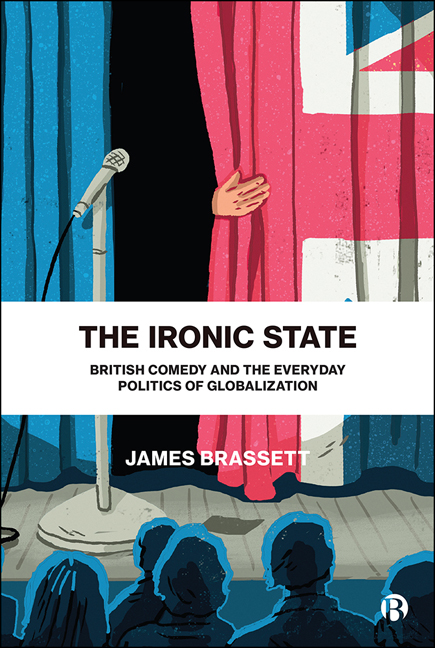Book contents
- Frontmatter
- Contents
- Acknowledgements
- Introduction: Comedy and the Politics of (Global) Resistance
- 1 Everyday Comic Resistance in Global Context
- 2 The Satire Boom: Imperial Decline and the Rise of the Everyday Elite
- 3 Alternative Comedy and Resistance to ‘Thatcher’s Britain’
- 4 Irony and the Liminality of Resistance
- 5 Austerity and the Rise of Radical Comedy
- 6 Brexit, or How I Learned to Stop Worrying and Love the Single Market
- 7 The Globalization of Comic Resistance?
- Bibliography
- Index
Introduction: Comedy and the Politics of (Global) Resistance
Published online by Cambridge University Press: 04 January 2022
- Frontmatter
- Contents
- Acknowledgements
- Introduction: Comedy and the Politics of (Global) Resistance
- 1 Everyday Comic Resistance in Global Context
- 2 The Satire Boom: Imperial Decline and the Rise of the Everyday Elite
- 3 Alternative Comedy and Resistance to ‘Thatcher’s Britain’
- 4 Irony and the Liminality of Resistance
- 5 Austerity and the Rise of Radical Comedy
- 6 Brexit, or How I Learned to Stop Worrying and Love the Single Market
- 7 The Globalization of Comic Resistance?
- Bibliography
- Index
Summary
British comedy is a widely consumed and distinctive cultural product. For some the British are virtually defined by their sense of irony, or a tendency for self-deprecation (Friedman, 2011; see also Fox, 2014). But humour and comedy are far more than static stereotypes. Over several decades, British comedy has emerged as a vibrant, productive, conflictual and avowedly resistant discourse within politics. From the 1960s ‘satire boom’ that chided the imperial pomposity of the upper-class establishment, through 1980s ‘alternative comedy’ that articulated dissent against Thatcher to embrace equality politics, and the rise of ‘radical comedy’ in the post-crisis, anti-austerity mode of Russell Brand or Charlie Brooker, British comedy has emerged as a vernacular through which resistance is imagined and performed (Brassett, 2016).
How can humour be resistant when it is part of a massive global industry? British comedy is big business. Sell-out tours, DVD sales, and cash-in memoirs are part of a burgeoning global entertainment industry. Keynote acts and producers like John Oliver, Ricky Gervais, Armando Iannucci and Richard Curtis straddle the lucrative US and UK markets. Comedy output by the BBC, Channel 4 and Sky is regularly distributed through global platforms like HBO, Netflix and Amazon. Yet British comedy is also a sophisticated genre that combines mainstream popularity with a capacity to challenge and provoke. Indeed, such provocation can be part of the schtick. As every satirist knows, controversy is good publicity and the moralizing think-piece industry has helped promote acts like Sacha Baron Cohen and Frankie Boyle (Hunt, 2010). The regular rehearsal of offence and outrage at jokes highlights a mismatch between the ideal of comic resistance and the material success and celebrity status of comedians (Lockyer and Pickering, 2009). Especially in a period of austerity, the radical politics of many comedians seems to fly in the face of their position within an immensely successful global industry.
Comedy thus animates broader dilemmas over the politics resistance. What do we resist and how? How do practices of resistance engage with – and sometimes reproduce – wider structures of power? To what extent is resistance recuperated within the cultural logic of global capitalism (Vintaghen and Johansson, 2013; Rossdale, 2019; see also Jameson, 1991)? In figuring comedy as a practice of everyday resistance in global context, this book develops a specific contribution to the study of comedy and politics.
- Type
- Chapter
- Information
- The Ironic StateBritish Comedy and the Everyday Politics of Globalization, pp. 1 - 16Publisher: Bristol University PressPrint publication year: 2021



